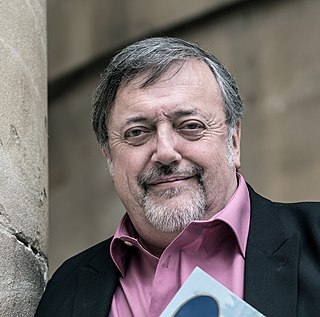A Quote by Keith Devlin
Outside observers often assume that the more complicted a piece of mathematics is, the more mathematicians admire it. Nothing could be further from the truth. Mathematicians admire elegance and simplicity above all else, and the ultimate goal in solving a problem is to find the method that does the job in the most efficient manner. Though the major accolades are given to the individual who solves a particular problem first, credit (and gratitude) always goes to those who subsequently find a simpler solution.
Quote Topics
Above
Accolades
Admire
Always
Assume
Could
Credit
Does
Efficient
Elegance
Else
Find
First
Further
Given
Goal
Goes
Gratitude
Individual
Job
Major
Manner
Mathematicians
Mathematics
Method
More
Most
Nothing
Observers
Often
Outside
Particular
Piece
Problem
Simpler
Simplicity
Solution
Solving
Those
Though
Truth
Ultimate
Ultimate Goal
Related Quotes
We find sects and parties in most branches of science; and disputes which are carried on from age to age, without being brought to an issue. Sophistry has been more effectually excluded from mathematics and natural philosophy than from other sciences. In mathematics it had no place from the beginning; mathematicians having had the wisdom to define accurately the terms they use, and to lay down, as axioms, the first principles on which their reasoning is grounded. Accordingly, we find no parties among mathematicians, and hardly any disputes.
... there are those who believe that mathematics can sustain itself and grow without any further contact with anything outside itself, and those who believe that nature is still and always will be one of the main (if not the main) sources of mathematical inspiration. The first group is identified as "pure mathematicians" (though "purist" would be more adequate) while the second is, with equal inadequacy, referred to as "applied".
Love begets wisdom, thus it is, as often misconceived, more than vain layers of tenderness; it is inherently rational and comprehensive of the problem within the problem: for instance, envy is one of the most excused sins in the media of political correctness. Those you find most attractive, or seem to have it all, are often some of the most insecure at heart, and that is because people assume that they do not need anything but defamation.
It is a melancholy experience for a professional mathematician to find himself writing about mathematics. The function of a mathematician is to do something, to prove new theorems, to add to mathematics, and not to talk about what he or other mathematicians have done. Statesmen despise publicists, painters despise art-critics, and physiologists, physicists, or mathematicians have usually similar feelings: there is no scorn more profound, or on the whole more justifiable, than that of the men who make for the men who explain. Exposition, criticism, appreciation, is work for second-rate minds.
Mathematicians are proud of the fact that, generally, they do their work with a piece of chalk and a blackboard. They value hand-done proofs above all else. A big question in mathematics today is whether or not computational proofs are legitimate. Some mathematicians won't accept computational proofs and insist that a real proof must be done by the human hand and mind, using equations.
The first and foremost duty of the high school in teaching mathematics is to emphasize methodical work in problem solving...The teacher who wishes to serve equally all his students, future users and nonusers of mathematics, should teach problem solving so that it is about one-third mathematics and two-thirds common sense.
Mathematicians can and do fill in gaps, correct errors, and supply more detail and more careful scholarship when they are called on or motivated to do so. Our system is quite good at producing reliable theorems that can be solidly backed up. It's just that the reliability does not primarily come from mathematicians formally checking formal arguments; it comes from mathematicians thinking carefully and critically about mathematical ideas.
Cities are never random. No matter how chaotic they might seem, everything about them grows out of a need to solve a problem. In fact, a city is nothing more than a solution to a problem, that in turn creates more problems that need more solutions, until towers rise, roads widen, bridges are built, and millions of people are caught up in a mad race to feed the problem-solving, problem-creating frenzy.




































